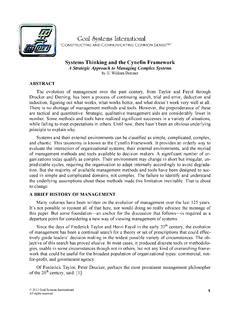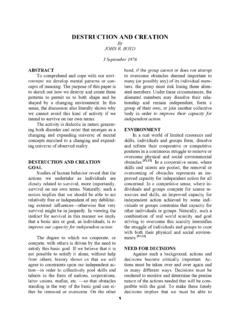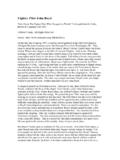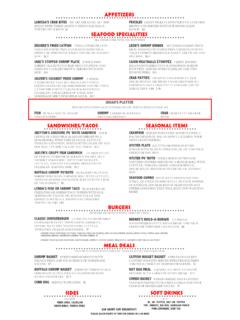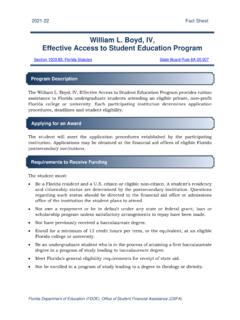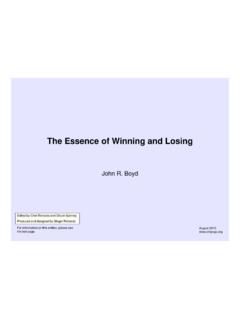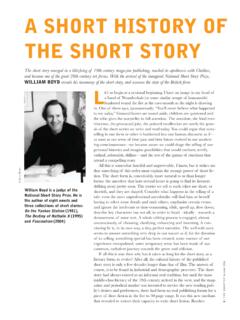Transcription of DESTRUCTION AND CREATION - Goal Systems International
1 1 DESTRUCTION AND CREATION By JOHN R. BOYD 3 September 1976 ABSTRACT To comprehend and cope with our envi-ronment we develop mental patterns or con-cepts of meaning. The purpose of this paper is to sketch out how we destroy and create these patterns to permit us to both shape and be shaped by a changing environment. In this sense, the discussion also literally shows why we cannot avoid this kind of activity if we intend to survive on our own terms. The activity is dialectic in nature generat-ing both disorder and order that emerges as a changing and expanding universe of mental concepts matched to a changing and expand-ing universe of observed reality. DESTRUCTION AND CREATION GOAL Studies of human behavior reveal that the actions we undertake as individuals are closely related to survival, more importantly, survival on our own terms.
2 Naturally, such a notion implies that we should be able to act relatively free or independent of any debilitat-ing external influences otherwise that very survival might be in jeopardy. In viewing the instinct for survival in this manner we imply that a basic aim or goal, as individuals, is to improve our capacity for independent action. The degree to which we cooperate, or compete, with others is driven by the need to satisfy this basic goal. If we believe that it is not possible to satisfy it alone, without help from others, history shows us that we will agree to constraints upon our independent ac-tion in order to collectively pool skills and talents in the form of nations, corporations, labor unions, mafias, etc. so that obstacles standing in the way of the basic goal can ei-ther be removed or overcome.
3 On the other hand, if the group cannot or does not attempt to overcome obstacles deemed important to many (or possibly any) of its individual mem-bers, the group must risk losing these alien-ated members. Under these circumstances, the alienated members may dissolve their rela-tionship and remain independent, form a group of their own, or join another collective body in order to improve their capacity for independent action. ENVIRONMENT In a real world of limited resources and skills, individuals and groups form, dissolve and reform their cooperative or competitive postures in a continuous struggle to remove or overcome physical and social environmental obstacles.[11,13] In a cooperative sense, where skills and talents are pooled, the removal or overcoming of obstacles represents an im-proved capacity for independent action for all concerned.
4 In a competitive sense, where in-dividuals and groups compete for scarce re-sources and skills, an improved capacity for independent action achieved by some indi-viduals or groups constrains that capacity for other individuals or groups. Naturally, such a combination of real world scarcity and goal striving to overcome this scarcity intensifies the struggle of individuals and groups to cope with both their physical and social environ-ments.[11,13] NEED FOR DECISIONS Against such a background, actions and decisions become critically important. Ac-tions must be taken over and over again and in many different ways. Decisions must be rendered to monitor and determine the precise nature of the actions needed that will be com-patible with the goal.
5 To make these timely decisions implies that we must be able to 2 form mental concepts of observed reality, as we perceive it, and be able to change these concepts as reality itself appears to change. The concepts can then be used as decision-models for improving our capacity for inde-pendent action. Such a demand for decisions that literally impact our survival causes one to wonder: How do we generate or create the mental concepts to support this decision-making activity? CREATING CONCEPTS There are two ways in which we can de-velop and manipulate mental concepts to rep-resent observed reality: we can start from a comprehensive whole and break it down to its particulars or we can start with the particulars and build towards a comprehensive whole.
6 [28,24] Saying it another way, but in a related sense, we can go from the general-to-specific or from the specific-to-general. A lit-tle reflection here reveals that deduction is related to proceeding from the general-to-specific while induction is related to proceed-ing from the specific-to-general. In following this line of thought, can we think of other ac-tivities that are related to these two opposing ideas? Is not analysis related to proceeding from the general-to-specific? Is not synthesis, the opposite of analysis, related to proceeding from the specific-to-general? Putting all this together: Can we not say that general-to-specific is related to both deduction and analysis, while specific-to-general is related to induction and synthesis?
7 Now, can we think of some examples to fit with these two opposing ideas? We need not look far. The differential calculus proceeds from the general-to-specific from a function to its derivative. Hence, is not the use or application of the dif-ferential calculus related to deduction and analysis? The integral calculus, on the other hand, proceeds in the opposite direction from a derivative to a general function. Hence, is not the use or application of the in-tegral calculus related to induction and syn-thesis? Summing up, we can see that: gen-eral-to-specific is related to deduction, analy-sis, and differentiation, while, specific-to-general is related to induction, synthesis, and integration. Now keeping these two opposing idea chains in mind let us move on a somewhat different tack.
8 Imagine, if you will, a domain (a comprehensive whole) and its constituent elements or parts. Now, imagine another do-main and its constituent parts. Once again, imagine even another domain and its con-stituent parts. Repeating this idea over and over again we can imagine any number of domains and the parts corresponding to each. Naturally, as we go through life we de-velop concepts of meaning (with included constituents) to represent observed reality. Can we not liken these concepts and their related constituents to the domains and con-stituents that we have formed in our imagina-tion? Naturally, we can. Keeping this rela-tionship in mind, suppose we shatter the cor-respondence of each domain or concept with its constituent elements.
9 In other words, we imagine the existence of the parts but pretend that the domains or concepts they were previ-ously associated with do not exist. Result: We have many constituents, or particulars, swimming around in a sea of anarchy. We have uncertainty and disorder in place of meaning and order. Further, we can see that such an unstruc-turing or DESTRUCTION of many domains to break the correspondence of each with its re-spective constituents is related to deduction, analysis, and differentiation. We call this kind of unstructuring a destructive deduction. Faced with such disorder or chaos, how can we reconstruct order and meaning? Going back to the idea chain of specific-to-general, induction, synthesis, and integration, the thought occurs that a new domain or concept can be formed if we can find some common 3 qualities, attributes, or operations among some or many of these constituents swimming in this sea of anarchy.
10 Through such connect-ing threads (that produce meaning) we syn-thesize constituents from, hence across, the domains we have just shattered.[24] Linking, particulars together in this man-ner we can form a new domain or concept providing, of course, we do not inadvertently use only those "bits and pieces" in the same arrangement that we associated with one of the domains purged from our imagination. Clearly, such a synthesis would indicate we have generated something new and different from what previously existed. Going back to our idea chain, it follows that creativity is re-lated to induction, synthesis, and integration since we proceeded from unstructured bits and pieces to a new general pattern or con-cept. We call such action a creative or con-structive induction.



